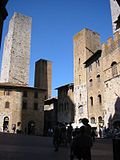Medieval commune
A medieval commune was a sworn allegiance of mutual defense. When a commune was formed, all participating members gathered and swore an oath together in public that they would defend one another in time of trouble. In addition, they would swear to maintain the peace within the city proper.
Medieval townspeople in Western Europe during the High Middle Ages needed protection from lawless nobles and bandits. The walled city was protection from direct assault, but once townspeeople left the city walls,they were at the mercy of nobles in the countryside, who were often often violent and lawless. Because much of medieval Europe had nothing like a police force, each city had to provide its own protection for citizens both inside and outside the city walls. That made towns form what are called "communes."
Obviously, if a commune member was attacked outside the city, it was too late to call for help since it no one would likely be around in time. Instead, the commune would promise to exact revenge on the attacker, which was a form of defence. However, if the attacker was a noble who had a castle that was too strong for the townspeople, as was often the case, and the town commune could certainly not gather the people to attack a castle. Instead, it might attack the noble's family, burn his crops, kill his serfs, or destroy his orchards. It was violent eye -or-eye revenge.
The commune movement started in the 11th century in northern Italy, which then had the most urbanized population in Europe, and in what is now Belgium, which then was also relatively urban. The movement then spread in the early 12th century to France, Germany, Spain and elsewhere. England never saw much of the commune movement because it was a comparitively quite well-run kingdom and so did not need local protection forces. Although in most cases, the development of communes was connected with that of the cities, there were also rural communes, notably in France and England, that were formed to protect the villagers' common interests.
The church and the king had mixed reactions to communes. On the one hand, they agreed that safety and protection from lawless nobles was in everyone's best interest. The communes' intention was to keep the peace through the threat of revenge, and the church was sympathetic to the result of peace. However, the church had its own ways to enforce the peace such as the Peace and Truce of God movement.
On the other hand, communes disrupted the order of medieval society. The eye-for-eye methods that communes used, an eye for an eye,, were generally not acceptable to the church or the king since violence causes violence. Normally, only the noble lords are allowed to fight, and the merchant townspeople were the workers, not the fighters. There was a sense that communes were a threat to the medieval three-tiered social order: those who work, those who pray, and those who fight. Communes crossed the line between working and fighting. As such communes were sometimes accepted but at other times by the church and the king. One of the most famous cases of a commune being suppressed and the resulting defiant urban revolt occurred in the French town of Laon in 1112.
Medieval Commune Media
Defensive towers at San Gimignano, Tuscany, bear witness to the factional strife within communes.
The defence of the Carroccio during the battle of Legnano (1176) by Amos Cassioli (1832–1891)

